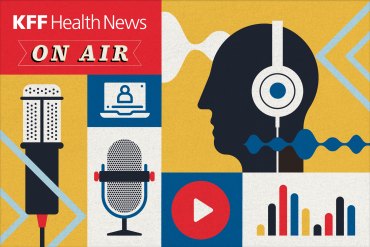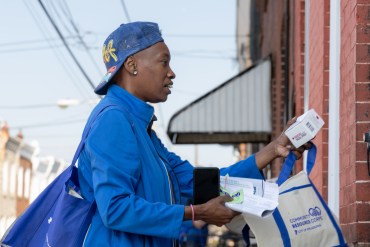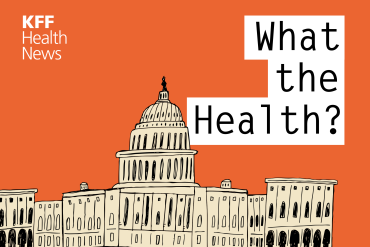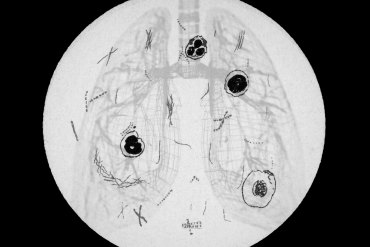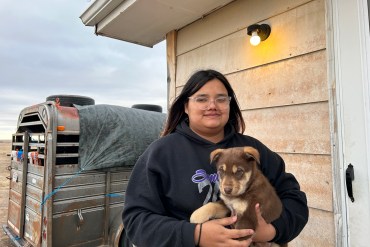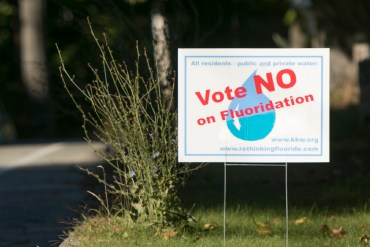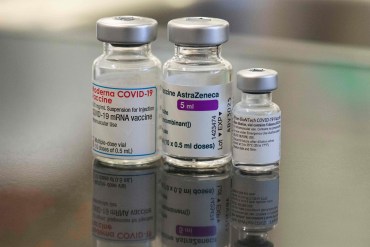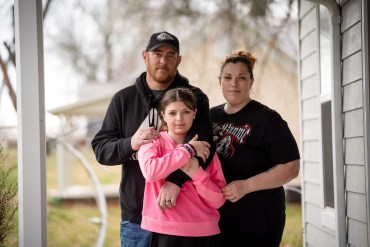Toxic Gas Adds to a Long History of Pollution in Southwest Memphis
People across the nation claim cancer-causing emissions from local sterilizing plants are making them sick. It’s an example of environmental racism, say residents of one predominantly Black area in southwest Memphis, Tennessee, where life expectancy is much shorter than county and state averages.
Journalists Drill Down on Bird Flu Risks, Opioid Settlement Payouts, and Fluoride in Drinking Water
KFF Health News and California Healthline staff made the rounds on national and local media over the past two weeks to discuss recent stories. Here’s a collection of their appearances.
Para frenar las muertes por fentanilo, reparten kits para revertir las sobredosis puerta por puerta
En Philadelphia, funcionarios esperan que este enfoque proactivo transforme a la naloxona en un artículo que esté en los botiquines, para evitar que las personas mueran por sobredosis, especialmente los residentes negros.
In San Francisco’s Chinatown, a CEO Works With the Community To Bolster Hospital
Jian Zhang, an immigrant from China with a doctorate in nursing, leads the 88-bed Chinese Hospital in San Francisco. The facility faces financial constraints like other independent hospitals, but its strong community support and partnerships have helped it weather tough times.
Newsom Offers a Compromise to Protect Indoor Workers from Heat
After rejecting proposed rules to protect millions of workers in sweltering warehouses, steamy kitchens, and other hot workplaces, California Gov. Gavin Newsom’s administration has offered a compromise to allow the protections to take effect this summer. But state and local correctional workers — and prisoners — would have to wait even longer.
What the Health? From KFF Health News: Too Big To Fail? Now It’s ‘Too Big To Hack’
Congress this week had the chance to formally air grievances over the cascading consequences of the Change Healthcare cyberattack, and lawmakers from both major parties agreed on one culprit: consolidation in health care. Plus, about a year after states began stripping people from their Medicaid rolls, a new survey shows nearly a quarter of adults who were disenrolled are now uninsured. Jessie Hellmann of CQ Roll Call, Sarah Karlin-Smith of the Pink Sheet, and Lauren Weber of The Washington Post join KFF Health News’ Mary Agnes Carey to discuss these stories and more. Also this week, KFF Health News’ Julie Rovner interviews Caroline Pearson of the Peterson Health Technology Institute.
The Path to a Better Tuberculosis Vaccine Runs Through Montana
Researchers at the University of Montana have pitched in to develop a more effective vaccine in the fight against an ancient disease that still kills an estimated 1.6 million people a year worldwide.
En Montana, investigan una nueva y poderosa vacuna contra la tuberculosis
La tuberculosis mata a 1.6 millones de personas anualmente, en especial en zonas pobres del planeta.
To Stop Fentanyl Deaths in Philadelphia, Knocking on Doors and Handing Out Overdose Kits
Facing widening racial disparities in overdose deaths, Philadelphia officials are sending workers and volunteers to knock on doors across the city, aiming to equip households with naloxone and other drug overdose prevention supplies. City officials hope a proactive approach will normalize naloxone as an everyday item in people’s medicine cabinets and prevent overdoses, especially among Black residents.
Native Americans Have Shorter Life Spans. Better Health Care Isn’t the Only Answer.
Social services, such as parenting classes and economic development programs, can help increase the life spans of Native Americans, some health experts say. But insurers don’t always cover these services.
Más condados prohíben el fluoruro en el agua potable. Cómo afecta a la prevención dental
En los últimos años cientos de comunidades han dejado de agregar fluoruro a sus suministros de agua o han votado para evitar agregarlo, a pesar que la ciencia dice que ese nutriente ayuda a la salud dental y previene gastos en tratamientos dentales.
As Bans Spread, Fluoride in Drinking Water Divides Communities Across the US
The broad availability of over-the-counter dental products containing fluoride has some community leaders arguing that its addition to public drinking water is no longer necessary. But public health experts worry that, much like vaccines, fluoridation may be a victim of its own success.
Journalists Assess the Risks of Bird Flu and the Impacts of Medicaid ‘Unwinding’
KFF Health News and California Healthline staff made the rounds on national and local media this week to discuss their stories. Here’s a collection of their appearances.
Heat Protections for California Workers Are in Limbo After Newsom Abandons Rules
Proposed rules to protect millions of workers from potentially dangerous heat inside workplaces are dead after Gov. Gavin Newsom’s administration refused to sign off. Labor advocates and state regulators are calling for emergency regulations before temperatures soar this summer.
California Universities Are Required to Offer Abortion Pills. Many Just Don’t Mention It.
One year after California became the first state to require public universities to provide abortion pills to students, LAist found that basic information for students to obtain the medication is often nonexistent.
Track Opioid Settlement Payouts — To the Cent — In Your Community
Want to know how much opioid settlement money your city, county, or state has received so far? Or how much it’s expecting in the future? Use our new searchable database to find out.
Four Years After Shelter-in-Place, Covid-19 Misinformation Persists
False claims that covid vaccines cause deaths and other diseases are still prevalent despite multiple studies showing the vaccines are safe and saved lives.
Journalists Dig Into Measles, Abortion Access, and Medicaid Expansion
KFF Health News and California Healthline staff made the rounds on national and local media in recent weeks to discuss their stories. Here’s a collection of their appearances.
A Physician Travels to South Asia Seeking Enduring Lessons From the Eradication of Smallpox
Physician and podcast host Céline Gounder traveled to India and Bangladesh and brought back never-before-heard stories, many from public health workers whose voices have been missing from the record documenting the eradication of smallpox.
Los hirieron en el desfile del Super Bowl: un mes después se sienten olvidados
Durante el primer mes, los líderes comunitarios de Kansas City han discutido cómo atender a las personas que quedaron atrapadas bajo el fuego cruzado y cómo distribuir los más de $2 millones donados a los fondos públicos para las víctimas bajo el doloroso impacto inicial.





